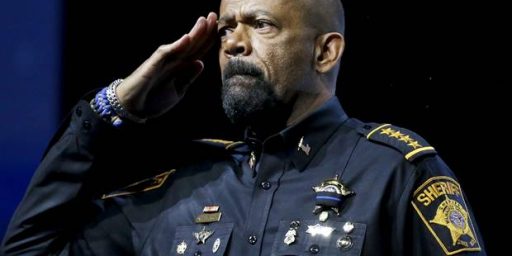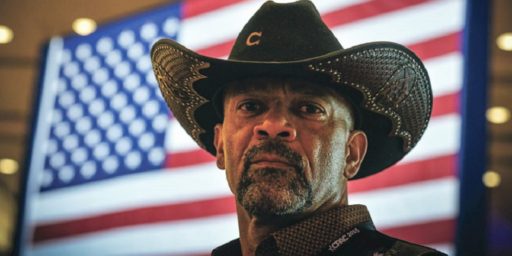Clinton and Al Qaeda
Buried in my e-mail this morning was a pointer to this Washington Times story: Al Qaeda absent from final Clinton report
The final policy paper on national security that President Clinton submitted to Congress — 45,000 words long — makes no mention of al Qaeda and refers to Osama bin Laden by name just four times.
The scarce references to bin Laden and his terror network undercut claims by former White House terrorism analyst Richard A. Clarke that the Clinton administration considered al Qaeda an “urgent” threat, while President Bush’s national security adviser, Condoleezza Rice, “ignored” it.
The Clinton document, titled “A National Security Strategy for a Global Age,” is dated December 2000 and is the final official assessment of national security policy and strategy by the Clinton team. The document is publicly available, though no U.S. media outlets have examined it in the context of Mr. Clarke’s testimony and new book.
Many pixels have been spilled on the politics of this by Jon Henke, Steve Antler, Betsy Newmark, Jonah Goldberg, Pejman Yousefzadeh, Wizbang guest-poster Paul, and presumably others, so no need to belabor the point here.
Does this prove that Bill Clinton and company were oblivious to terrorism? No, of course not. It does, however, belie Richard Clarke’s argument that it was somehow THE focus of Clinton foreign policy. Which, of course, we already knew it wasn’t. Also, to be fair, most of us personalized al Qaeda before 9/11. Indeed, my reaction on the morning of 9/11, when it became clear that the attack on the World Trade Center was the work of terrorists was that “Osama bin Ladin”–not “al Qaeda”–was responsible.
The 84-page document is available in HTML and PDF format from the Air War College, among other places. Reading the Fundamentals of the Strategy section–the opener that serves as the executive summary–gives a pretty clear view of what the thinking was. It is over 4200 words and mentions terrorism only in passing–although several times–and Osama bin Ladin/al Qaeda not at all. Clarke’s handiwork is on the document, too, as cyberterrorism gets a token mention.
Clearly, the focus is on more traditional goals, most especially economic globalization. In the context of that time, that was entirely appropriate in my judgment. In hindsight, of course, it seems unwise.





Here is a link to the actual report which contains these paragraphs:
http://www.au.af.mil/au/awc/awcgate/nss/nss_dec2000_contents.htm
Key paragraph:
“Afghanistan remains a serious threat to U.S. worldwide interests because of the Taliban’s continued sheltering of international terrorists and its increasing export of illicit drugs. Afghanistan remains the primary safehaven for terrorists threatening the United States, including Usama bin Ladin. The United Nations and the United States have levied sanctions against the Taliban for harboring Usama bin Ladin and other terrorists, and will continue to pressure the Taliban until it complies with international requests to bring bin Ladin to justice. The United States remains concerned about those countries, including Pakistan, that support the Taliban and allow it to continue to harbor such radical elements. We are engaged in energetic diplomatic efforts, including through the United Nations and with Russia and other concerned countries, to address these concerns on an urgent basis.”
This is the only use of the word “urgent” in the whole report. Also:
“Whenever possible, we use law enforcement, diplomatic, and economic tools to wage the fight against terrorism. But there have been, and will be, times when those tools are not enough. As long as terrorists continue to target American citizens, we reserve the right to act in self-defense by striking at their bases and those who sponsor, assist, or actively support them, as we have done over the years in different countries.
Fighting terrorism requires a substantial commitment of financial, human, and political resources. Since 1993, both the FBI’s counterterrorism budget and the number of FBI agents assigned to counterterrorism have more than doubled. The President has also created and filled the post of National Coordinator for Security, Infrastructure Protection, and Counterterrorism. Three presidential directives now coordinate the efforts of senior counterterrorism personnel from various government agencies in dealing with WMD and other threats at home. The FBI and the State Department, respectively, operate Rapid Deployment Teams and interagency Foreign Emergency Support Teams to deploy quickly to scenes of terrorist incidents worldwide.”
Don’t forget that it is not only Clarke who is pushing this lie, but Clinton himself has said that al Qaeda was the number one priority of his administration. Of course he only said that after 9/11; prior to the attacks his number one priority oscillated between Northern Ireland and the Middle East, depending on which fundraiser he was attending.
The fact that people still apologize for that eight-year national embarrassment never ceases to amaze me.
In President Clinton’s last terrorism report, the name “Usama bin Ladin” (please note the spelling) appears four times. Please correct your report.
Dr. Daniel Wolf
Budapest, Hungary
From The Washington Monthly – a “correction” of the garbage from the Washington Times.
A couple of comments:
The full report is here. If you’re looking for the four references, note that OBL’s name is spelled “Usama bin Ladin.” Sure enough, he’s mentioned four times.
On the other hand, “terrorism” is mentioned seven times in the introduction alone and 58 times in the main section on “Implementing the Strategy.” What’s more, in the major section titled “Protecting the Homeland” there are seven primary issues discussed. Two of them are “Combating Terrorism” and “Domestic Preparedness Against Weapons of Mass Destruction.”
It’s also worth noting that far from considering terrorism a mere law enforcement activity, terrorism gets an entire paragraph in the section titled “Military Activities”:
Bloggers don’t necessarily need to be balanced. But they must be fair. Most of all, they must be accurate. Or they’re not worth much more than the crap-peddlers of the old Soviet Empire.
SJ: What are you talking about? I’ve quoted a newspaper report, provided a direct link to the government document in question (actually two), and accurately summarized it.
Well, actually, James, you didn’t summarize it accurately. As other commenters have had to point out in this blog and others, the report does mention bin Laden, four times. Too, your characterization of terrorism as being mentioned “only in passing” in the summary fails to point out that all issues are only mentioned in passing in that summary; it’s composed that way, laundry-list style, as, you know, a summary would be.
I do agree with your take on the absence of the name, Al Qaeda. As many of your fellow travellers have failed to understand, that term was a bit exotic prior to 9/11, and therefore even Condi Rice’s not having heard of it is understandable. But, of course, the attack dogs raised the issue out of the gate in order to discredit Clarke, something like you’re doing here.
Look, Clarke never said that the Clinton administration was focusing on terror to the exclusion of everything else, nor has he claimed that the Bush administration completely ignored terror as an issue. He just believes that the Clintons were more aware of the problem and the transition represented a step back, of sorts. That you can glean some great contradiction between this broadly written government document, composed by god knows how many people, and Clarke’s pin-point recollections is telling.
It tells me that you, a very serious and normally trustworthy conservative partisan, are quite willing to put off a serious discussion of the place of Iraq in the WoT, which is all that Clarke wants in the first place. For by sliming Clarke you are postponing this national conversation at a time it appears we need to be having it.
Psst. Clarke’s gay, too.
BH:
From the OPENING SENTENCE of the WT quote: “The final policy paper on national security that President Clinton submitted to Congress — 45,000 words long — makes no mention of al Qaeda and refers to Osama bin Laden by name just four times.”
I say that it “mentions terrorism only in passing—although several times.” That is, terrorism is mentioned along with other things but isn’t given nearly the priority of other things in the essay. It’s not a laundry list–it’s a mission statement.
It never fails. Whenever a document surfaces that shows Clinton in a less than godlike light, defenders emerge from the woodwork to spin it, and to try to discredit those discussing the document.
I’ll post this again:
From an exerpt on The Washington Monthly:
“terrorism” is mentioned seven times in the introduction alone and 58 times in the main section on “Implementing the Strategy.” What’s more, in the major section titled “Protecting the Homeland” there are seven primary issues discussed. Two of them are “Combating Terrorism” and “Domestic Preparedness Against Weapons of Mass Destruction.”
That far exceeds “mentions terrorism only in passing”!